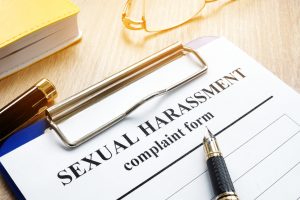This site uses cookies to provide you with a more responsive and personalized service. By using this site you agree to our use of cookies. You can learn more about our use of cookies and similar technologies and your choices by reviewing our Privacy Policy. By clicking “I agree” you agree to our use of cookies and similar technologies.
Association of American Universities Adopts Principles to Address Sexual Misconduct and Retaliation on University Campuses
 The presidents and chancellors of the Association of American Universities (“AAU”), an organization composed of 66 research universities across the U.S., announced on October 26, 2021, that it adopted eight new principles to address sexual misconduct in all forms, including sexual and gender-based harassment and related retaliation.
The presidents and chancellors of the Association of American Universities (“AAU”), an organization composed of 66 research universities across the U.S., announced on October 26, 2021, that it adopted eight new principles to address sexual misconduct in all forms, including sexual and gender-based harassment and related retaliation.
In a strongly worded statement, the AAU and its member institutions declared that they are unanimously “dedicated to supporting an environment in which students, staff, and faculty can fully participate in the campus community, while free from gender-based harassment, sexual harassment, and other sexual misconduct, and where the institution does not tolerate retaliation for reporting such misconduct or participating in the process to address it.”
The 66 AAU research universities, of which approximately 85% have centralized ethics and compliance programs with varying structures and reporting lines, and a similar number that have institution-wide Codes of Ethical Conduct and Protections from Retaliation policies either as standalone documents or prominently displayed in their respective Codes, have set out an ambitious objective for combating sexual and gender-based misconduct and protecting community members from retaliation.
The eight new principles adopted by AAU are as follows:
- Foster a climate and culture where sexual misconduct is unacceptable, and implement policies and practices aimed to support a harassment-free learning, living and working environment for all members of the campus community.
- Educate our campus communities about, and elevate the importance of, institutional values, policies, and expectations of individual behavior, including how to report sexual misconduct and how to support fellow community members who have experienced sexual misconduct.
- Provide support and remove barriers for all of those who report, making certain to have resources directed toward those in groups who most often experience harassment and other forms of sexual misconduct.
- Address reports of sexual misconduct in a manner that is consistent with the institution’s process, respectful, ethical, appropriately thorough, and timely.
- Hold accountable, in a fair and equitable manner, those students, faculty, staff, and administrators at all levels who are found responsible for such violations.
- In making hiring decisions, request or require applicants to provide written consent to release personnel information from their prior employer of substantiated findings of sexual misconduct, consistent with applicable law.
- Share substantiated findings of sexual misconduct with prospective employers when requested, upon receipt of written authorization when necessary, and consistent with applicable law.
- To the extent possible, complete all investigations into sexual misconduct, notwithstanding the departure of the respondent from the institution.
Implementation will require a great deal of work. Each AAU institution will need to determine who will own responsibility, i.e., ethics and compliance, human resources or each institution’s variation of an equity, civil rights, and Title IX office, or some coordinating combination of them all.
That said, each AAU institution should consider and take a number of steps, including but not limited to a comprehensive assessment of its ethics and compliance programs for preventing and investigating sexual and gender-based misconduct and related protections from retaliation. If the institution does not have the capacity to conduct such an assessment, an outside consultant can help avoid a delay in taking this critical step in a timely manner.
The assessment should include a review of the following:
- Ethics + Compliance Programs
Do the ethics and compliance programs meet the needs of the institution and are they tailored to ensure that the end product is comprehensive, sustainable and effective? - Title IX + Clery Act
Do administrators and campus public safety officials understand their obligations under the Clery Act and associated regulations as well as Title IX? Has the institution developed the procedures necessary to satisfy the requirements under these federal laws? - Training
What type and how often is training provided in the areas of Title IX and Clery Act, as well as general ethics and compliance? - Community Engagement Plan
Robust, meaningful, and inclusive communication with community members and other stakeholders is essential in addressing, identifying, and preventing sex, race and gender-based violence. - Institutional Governance
Effective governance is the outcome of a range of institutional policies, processes, and cross-functional interactions. It is the key to ensuring that an institution’s resources and systems operate in a way that meets the applicable laws and regulations. Review governance frameworks, documentation processes and procedures, board reporting, director training, and board evaluations, all with an eye to ensuring the necessary conditions for sound governance.
Ethical crises and similar problems can be averted by taking a proactive and forward-looking review of an institution’s ethics and compliance programs.

Bradley L. Dizik
President, Emerging Issues + Technology
Bradley Dizik advises publicly held, private and not-for-profit institutions on integrity issues, including development and evaluation of ethics and compliance programs and related best practices, institutional structure and culture, risk oversight, board and committee structure, board and executive leadership, independent and internal investigations, and audits and assessments. Mr. Dizik is currently advising the President and Board of Regents of the University of Michigan on the implementation of internal controls and structural and cultural transformation efforts in response to its sexual misconduct crisis. He is also a key member of the team investigating and assessing the Southern Baptist Convention’s handling of sexual abuse allegations and related treatment of survivors and practice reform efforts.


